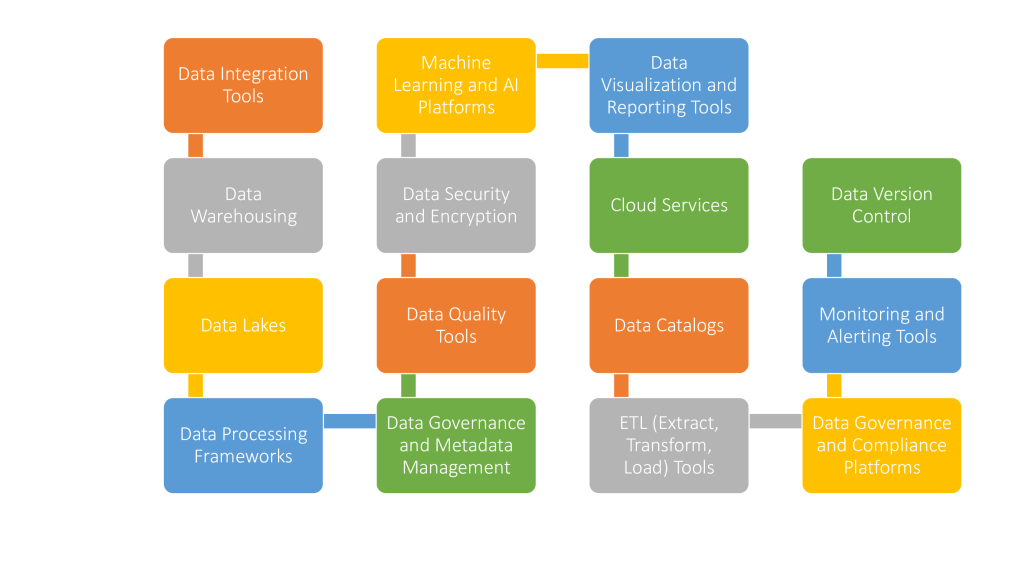Implementing Data Strategy: Key Technologies

Implementing a robust data strategy requires the use of various technologies and tools to effectively collect, process, store, and analyze data. Here are some key technologies commonly used in implementing a data strategy:
- Data Integration Tools: Tools like Apache Nifi, Talend, and Informatica enable you to collect and integrate data from various sources, ensuring data consistency and quality.
- Data Warehousing: For storing and managing structured data, data warehousing solutions like Amazon Redshift, Google BigQuery, and Snowflake provide scalability and high-performance analytics capabilities.
- Data Lakes: Data lakes such as Amazon S3, Azure Data Lake Storage, and Google Cloud Storage are ideal for storing large volumes of structured and unstructured data in their native formats.
- Data Processing Frameworks: Frameworks like Apache Hadoop and Apache Spark are used for batch and real-time data processing, enabling data transformation, cleaning, and analysis at scale.
- Data Governance and Metadata Management: Tools like Apache Atlas, Collibra, and Alation help organizations establish data governance policies, manage metadata, and ensure data quality and compliance.
- Data Quality Tools: Tools such as Talend Data Quality, Trifacta, and Informatica Data Quality assist in cleaning and validating data to maintain its accuracy and reliability.
- Data Security and Encryption: Technologies like encryption, access control, and identity management solutions (e.g., Okta, Azure Active Directory) ensure data security and compliance with regulatory requirements.
- Machine Learning and AI Platforms: Tools like TensorFlow, PyTorch, and scikit-learn are used to build and deploy machine learning models for advanced analytics and predictive insights.
- Data Visualization and Reporting Tools: Tools like Tableau, Power BI, and Qlik provide user-friendly interfaces for creating interactive dashboards and reports to communicate data insights.
- Cloud Services: Public cloud platforms like AWS, Azure, and Google Cloud offer a wide range of services for data storage, processing, analytics, and machine learning, making it easier to scale and manage data infrastructure.
- Data Catalogs: Data catalog solutions like AWS Glue Data Catalog and Azure Purview help organizations discover, catalog, and search for data assets across their environment.
- ETL (Extract, Transform, Load) Tools: ETL tools like Apache Beam, Apache Camel, and Microsoft SSIS facilitate the extraction, transformation, and loading of data from source systems to target data stores.
- Data Governance and Compliance Platforms: Platforms like Collibra and Informatica Axon provide comprehensive data governance, compliance, and data lineage capabilities.
- Monitoring and Alerting Tools: Monitoring tools like Prometheus, Grafana, and Splunk help track the health and performance of data platforms and trigger alerts for any issues.
- Data Version Control: Tools like Git and Git-based platforms (e.g., GitHub, GitLab) help manage code and configurations related to data pipelines and analytics workflows.
Implementing a data strategy is a complex endeavor that requires selecting the right mix of these technologies based on your organization’s specific needs and objectives. A successful data strategy should align technology choices with your business goals and ensure data is accessible, secure, and valuable for decision-making.

